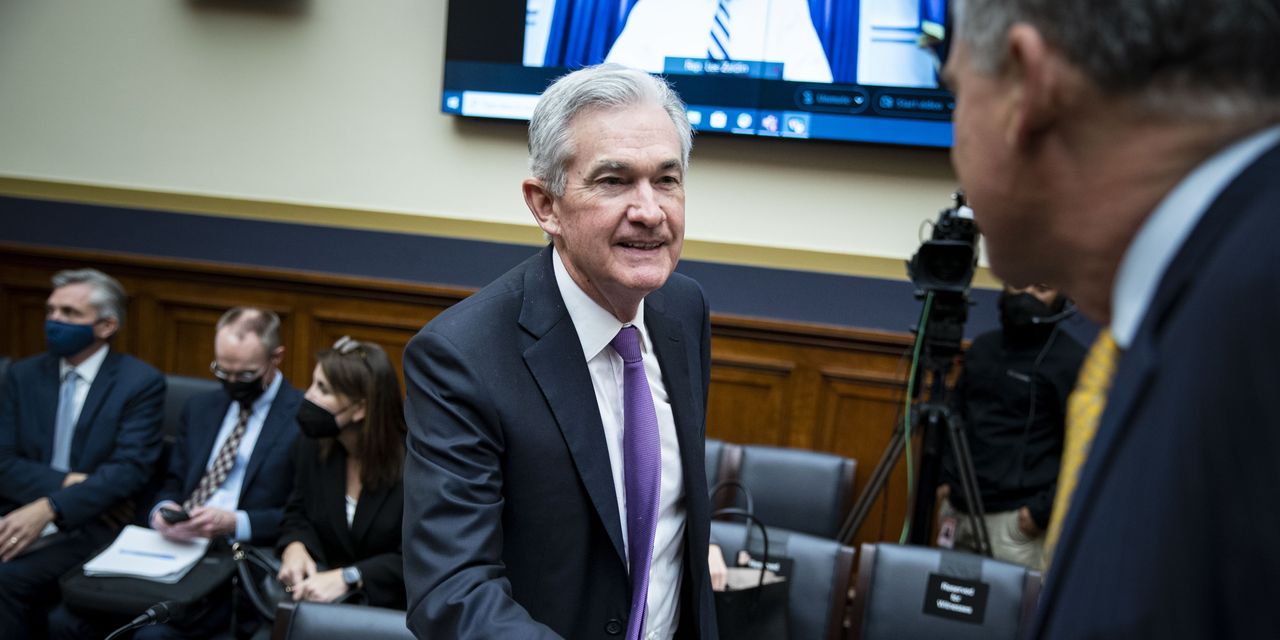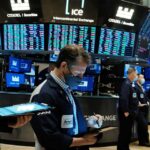
Federal Reserve Chairman Jerome Powell is expected to win a second term leading the central bank but must first face a grilling Tuesday at his Senate confirmation hearing after pivoting recently to tighten policy to combat inflation.
When annual inflation readings began to rise above 4% last summer, Mr. Powell told lawmakers that it would be a mistake to raise interest rates in response to one-time increases in certain prices, like for air travel and used cars, whose prices were surging due the bumpy reopening of the U.S. economy.
By the Fed’s December policy meeting, after several months of rising inflation, Mr. Powell and his colleagues had penciled in three quarter-point rate increases this year. And over the past week, they have signaled they could start moving in March.
While Mr. Powell’s ultimate confirmation isn’t in doubt, Senate Banking Committee members at the hearing will want him to explain why the Fed has shifted course and how he plans to contain inflation, said Andrew Olmem, who was deputy director of the White House National Economic Council under former Republican President Donald Trump.
“This nomination hearing is coming at one of the most complicated times in recent Fed history, with a significant policy shift under way while there’s still a fair amount of uncertainty about the future path of the pandemic” and the economy, said Mr. Olmem, a former senior Senate aide who is now a partner at law firm Mayer Brown.
Of the 84 lawmakers who voted to confirm Mr. Powell, a Republican, four years ago, 68 are still in office, equally split between the two party caucuses. Several lawmakers of both parties expressed support for Mr. Powell when President Biden announced his reappointment in November, including Sens. Sherrod Brown (D., Ohio) and Pat Toomey (R., Pa.), the top Democrat and Republican, respectively, on the committee.
Mr. Powell led his colleagues at their meeting last month to wind down their bond-buying stimulus program in March, opening the door to raising rates then. Over the past week, they have dropped hints they may start shrinking their asset portfolio soon after that point, which would be another form of tightening policy.
Mr. Powell has been trying to balance two risks over the past year—raising rates prematurely and risking a period of prolonged, elevated unemployment or leaving them ultra low and letting higher inflation become entrenched, forcing a faster adjustment later.
Officials were wary last year of overreacting to one-time price increases by raising rates and cooling down the labor market if supply-chain bottlenecks were a primary driver of inflation and were expected to reverse themselves over time.
If inflation stayed too high or began to seep into consumers’ and businesses’ expectations of future inflation, which can be self-fulfilling, the Fed would change course, he said. “There may come a time when the risks may flip,” Mr. Powell said.
The risks flipped in the fall as evidence mounted that demand was stronger than expected and might fuel broader and sustained price pressures, even if idiosyncratic increases due to supply problems reversed later.
“There’s a real risk now, I believe, that inflation may be more persistent and…the risk of higher inflation becoming entrenched has increased,” Mr. Powell explained at a news conference last month.
In prepared testimony for Tuesday’s hearing, which was released Monday, Mr. Powell said the central bank would use its tools “to prevent higher inflation from becoming entrenched.”
Officials are now signaling they don’t want to underreact as wages rise, which could fuel a more traditional inflationary cycle. They are giving more weight to the prospect that the aggressive fiscal- and monetary-policy responses to the pandemic over the past two years may have altered traditional recessionary dynamics, buoying wage growth that normally takes longer to recover after a downturn.
A sharp run-up in home values, stocks and other assets has boosted wealth for many Americans, fueling stronger demand and potentially allowing some to retire earlier than they had anticipated, tightening the labor market. Demand might rise higher still if the pandemic subsides, boosting spending on services and leading more Americans to seek jobs.
“We can begin to see that the post-pandemic economy is likely to be different in some respects. The pursuit of our goals will need to take these differences into account,” Mr. Powell said in his written testimony Monday. Monetary policy needs to “take a broad and forward-looking view, keeping pace with an ever-evolving economy.”
President Biden’s political fortunes may be tied to how Mr. Powell responds. If the Fed does too little or is too late, Americans could face higher inflation for years or the central bank could be forced to raise rates aggressively, convulsing financial markets and putting the economy into a downturn. If it moves too fast or too soon, it risks prematurely slowing down hiring.
Brisk demand for goods, disrupted supply chains and various shortages have pushed 12-month inflation to its highest readings in decades. Core consumer prices, which exclude volatile food and energy categories, were up 4.7% in November from a year earlier, according to the Fed’s preferred gauge. That is well above the Fed’s 2% target.
But it has been developments in the labor market, and not just high inflation readings, that have provided fuel for the Fed’s shift in recent weeks toward tightening policy much faster than appeared likely last summer.
The unemployment rate, which fell to 3.9% in December, is now lower than it was four years ago, when Mr. Powell became Fed chairman. That is despite the upheaval wrought by the pandemic, which sent joblessness to a post-World War II record of 14.7% in April 2020.
Michael Gapen, chief U.S. economist at Barclays, said he still thinks inflation is likely to fall this year because he believes price increases have resulted primarily from the pandemic and not because the Fed has pumped more money into the economy. “The main reason inflation is high is relative demand and bottlenecks, which are a pandemic story. The policy stance is secondary,” he said.
Others are worried that higher home prices and rents will keep inflation well above the Fed’s target this year. “Even if some of the transitory elements disappear, it’s going to be very difficult to get inflation below 4%,” said Kenneth Rosen, housing economist at the University of California, Berkeley.
A potentially difficult question looms if inflation doesn’t drop this year, as most forecasters and Fed officials expect. “If inflation continues, how high do interest rates have to go in order to reverse it?” said Adam Posen, president of the Peterson Institute for International Economics.
At an economics conference this past week, some economists from both sides of the aisle warned that the Fed may have waited too long to raise rates, particularly after congressional Democrats and the White House last March passed $1.9 trillion in fiscal stimulus in the Covid-19 relief bill.
Engineering a so-called soft landing in which the Fed slows the job market enough to cool down inflation but not so much as to trigger a downturn “will require the Fed to be both lucky and smart,” said Glenn Hubbard, a senior economic adviser to former GOP President George W. Bush.
Mr. Posen said the Fed was right to hold its fire last year despite the difficult balancing act that may loom ahead. “I still think they can get it under control without causing a major recession. I don’t mind that there has been some overshooting,” he said.
Write to Nick Timiraos at [email protected]
Copyright ©2022 Dow Jones & Company, Inc. All Rights Reserved. 87990cbe856818d5eddac44c7b1cdeb8








